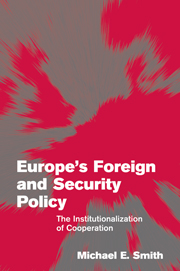Book contents
- Frontmatter
- Contents
- List of tables
- Acknowledgments
- List of abbreviations
- Introduction: foreign and security policy in the European Union
- Part I Institutions and foreign policy cooperation: the theoretical and empirical terrain
- Part II The institutionalization of cooperation
- 3 Origins: intergovernmentalism and European Political Cooperation
- 4 Information-sharing and the transgovernmental EPC network
- 5 Norms, rules, and laws in European foreign policy
- 6 Organizations and European foreign policy
- 7 Toward governance: the Common Foreign and Security Policy
- Part III Residual institutional issues
- Conclusion: beyond the CFSP: institutions, defense, and the European identity
- References
- Index
7 - Toward governance: the Common Foreign and Security Policy
Published online by Cambridge University Press: 21 January 2010
- Frontmatter
- Contents
- List of tables
- Acknowledgments
- List of abbreviations
- Introduction: foreign and security policy in the European Union
- Part I Institutions and foreign policy cooperation: the theoretical and empirical terrain
- Part II The institutionalization of cooperation
- 3 Origins: intergovernmentalism and European Political Cooperation
- 4 Information-sharing and the transgovernmental EPC network
- 5 Norms, rules, and laws in European foreign policy
- 6 Organizations and European foreign policy
- 7 Toward governance: the Common Foreign and Security Policy
- Part III Residual institutional issues
- Conclusion: beyond the CFSP: institutions, defense, and the European identity
- References
- Index
Summary
The SEA represented a significant step forward for European foreign policy, yet the EU, like much of the world, was caught off-guard by the momentous events of 1989–91, beginning with the fall of the Berlin Wall and ending with the disintegration of the Soviet Union and Yugoslavia. There is no doubt these exogenous changes prompted major reforms in a number of institutions, including NATO, the EU, the WEU, and the CSCE, and helped create entirely new ones, such as the European Bank for Reconstruction and Development (Keohane, Nye, and Hoffman 1993). However, it is also clear that the specific institutional reforms of EU foreign policy resulting from these events largely reflected endogenous, path-dependent processes. Rather than a decisive break with the past, the CFSP represented a natural, logical progression by both clarifying what had been achieved through EPC and building only a few truly innovative goals and procedures onto that mechanism. Virtually all elements of EPC described in previous chapters were affected, and they clearly laid the foundation for the CFSP at Maastricht.
Yet a closer examination of both the treaty-based provisions of the CFSP and its early performance suggests that European foreign policy has in fact reached a new level of institutionalization. In particular, we can describe this evolution as moves toward a system of governance, broadly defined for the moment as the authority to make, implement, and enforce rules in a specified policy domain.
- Type
- Chapter
- Information
- Europe's Foreign and Security PolicyThe Institutionalization of Cooperation, pp. 176 - 206Publisher: Cambridge University PressPrint publication year: 2003



